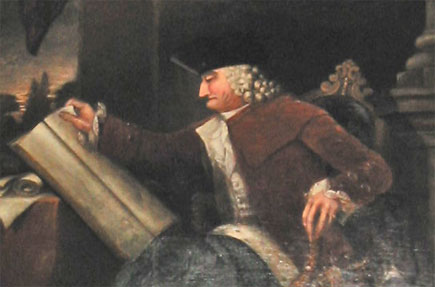I learned a lot this year, teaching my kids early American history--and one of the things I'd never known before was about how the colony of Georgia came to be.
 |
| James Oglethorpe |
It began in the mind of General James Oglethorpe, who was greatly disturbed by all the poor he saw in London--and the drunkeness. He as his friends had been discussing the woeful situation for quite a while, with no ready solution coming to mind. Then one day they saw a map of North America, and they noticed a large swath of land still unclaimed on the Eastern seaboard, between English South Carolina and Spanish Florida.
In their minds, claiming this land as a charity colony would solve two problems at once--form a barricade between Spanish lands and the rest of the English colonies, and give them a place to send some of London's poor. It was, they determined, a brilliant idea! In short order, they had it all planned out: they would set up silk farms in this colony, which would enable Britain to get its silks from an English-held source instead of foreign countries. They were absolutely sure they could plant mulberry trees in Georgia and introduce silk worms onto them.
 |
| The silkworm |
By the numbers given by Sir Thomas Lombe--silk expert--the men estimated that they could employ 40,000 in this pursuit, thereby giving livelihoods and means to the poor. They would soon be providing all of England's silk needs. Then selling it to the rest of the world! Certain of the beauty of this plan, they proposed naming the colony Georgia after the reigning King George II--and the king, liking what he heard, heartily agreed and granted a charter.
Now comes the but...
But this was all theory. None of these men had ever gone to Georgia, certainly not with any notoriously finicky silkworms. These creatures are strange and delicate, feeding exclusively on the leaves of white mulberry trees.
 |
| A black mulberry tree |
And the mulberry trees growing in Georgia? Black. Black mulberry trees, and the silkworms wouldn't have anything to do with them.
The founders of Georgia had already advertised for the most "distressed, virtuous, and industrious" of London's poor, and they'd made them sign contracts committing to planting X-amount of mulberry trees. These contracts stipulated that the people didn't own the land...or the tools...or the clothing...or the food.
Reality, of course, was far different from this utopia envision by Oglethorpe and his friends. The first group of settlers arrived in 1732 and were promptly scorched by heat far worse than to what they were accustomed. And when the silk crop failed, the settlers were blamed, not helped to find other crops. By the time of the Revolution, Georgia was the most sparsely populated and poorest colony in the Americas. A wonderful vision, poorly executed.
~*~
Roseanna M. White pens her novels beneath
her Betsy Ross flag, with her Jane Austen action figure watching over her. When
not writing fiction, she’s homeschooling her two children, editing and
designing, and pretending her house will clean itself. The Lost Heiress is Roseanna’s tenth published book. Her novels
range from biblical fiction to American-set romances to her new British series.
She lives with her family in West Virginia. Learn more at www.RoseannaMWhite.com

Fascinating, Ro!
ReplyDeleteRosanna, I did not know that. Thank you for sharing.
ReplyDeleteBlessings, Tina
I didn't recall ever learning that either, until I read it to my kids! =)
ReplyDeleteRoseanna, great research! You bet I was interested in my neighboring state.
ReplyDeleteI knew some of this, but not all you shared. I am going to share your blog.
Blessings, Elva Cobb Martin, Pres. ACFW-SC Chapter